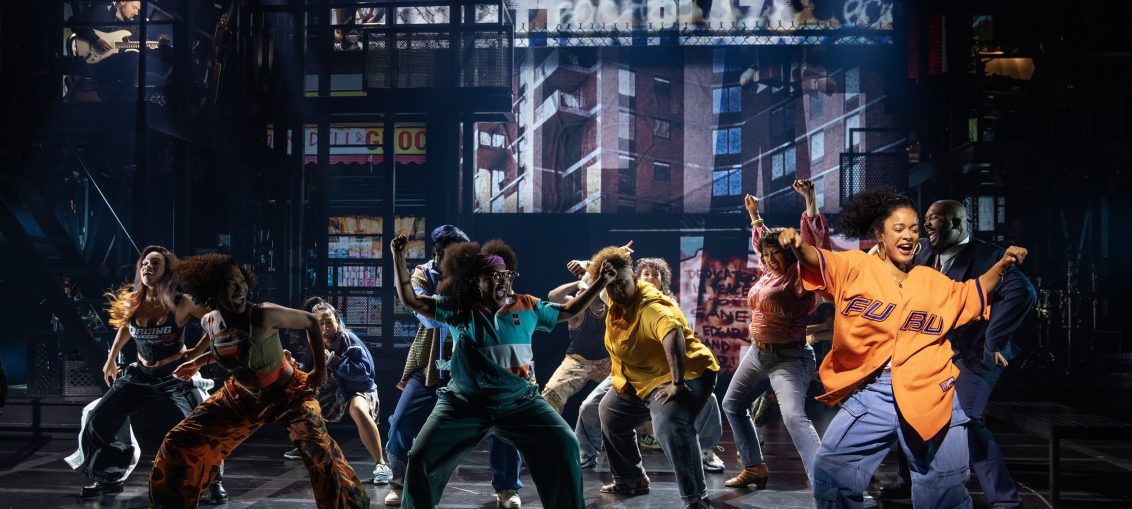
HELL’S KITCHEN, a new musical at The Public Theater set in New York’s iconic, eclectic Midtown West neighborhood, is a coming-of-age story about a typical teenager dealing with quintessential teen dramas — family, friends, a boyfriend, love, loss, disappointment, and the spark that defines her path and purpose — at a critical time in her life that shapes the future of what she will become — a beloved international superstar.
That superstar is Alicia Keys, the fifteen-time Grammy Award-winning singer, songwriter, musician, producer, best-selling author, actress, film/TV/Broadway producer, entrepreneur and global activist. She’s a force of nature and a source of inspiration worldwide. Earlier this year, when I was in Al’Ula, Saudi Arabia, producing a bespoke theatrical experience about the incense road, she was there performing at Maraya Concert Hall (meaning “reflection” in Arabic, the largest mirrored building on Earth, nestled in the northwestern desert, reflecting the Martian-like landscape) and giving women’s empowerment talks.
But HELL’S KITCHEN is not about Keys’ meteoric rise to stardom beginning with the 2001 release of her monumental album, Songs in A Minor, which solidified her celestial spot in the musical stratosphere when she was merely 20. It’s about her humbler beginnings being raised by a single mom in the eccentric artists’ affordable housing complex, Manhattan Plaza, claiming both corners of 9th and 10th Avenue on 43rd Street at age 17, around the time she started writing and recording songs that would become her iconic debut album.
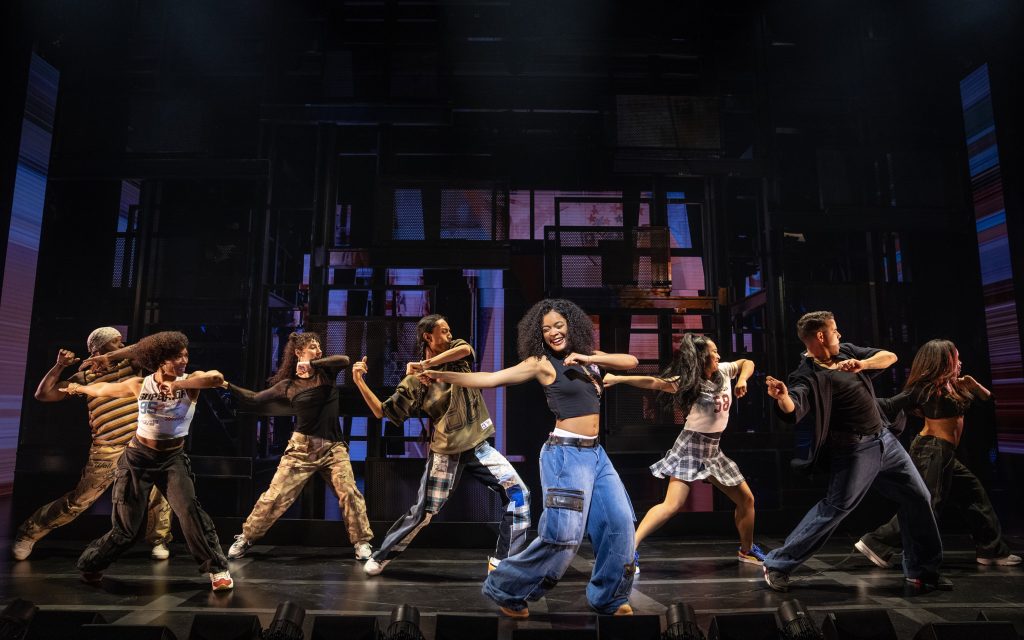
Adam Blackstone, choreography by Camille A. Brown, and direction by Michael Greif – at The Public
Theater. Photo Credit: Joan Marcus
Helmed by an all-star, highly-awarded or nominated team including director Michael Greif and choreographer Camille A. Brown, with a book by Kristoffer Diaz, music supervision, orchestrations and arrangements by Adam Blackstone (with additional orchestrations and consultation by Tom Kitt), with of course, music and lyrics by Alicia Keys, HELL’S KITCHEN is described as “loosely based” on Keys’ personal experiences. But with many characters and locations closely related to actual people and places that shaped the multi-hyphenate star’s life and career, the story feels deeply intimate, a keyhole glimpse into the moment before her life changed forever. After all, the primary role and narrator is called Ali (a solid breakout professional debut by Maleah Joi Moon). But just how true to reality and autobiographical is it? Only Alicia will know but read on for insights from Manhattan Plaza neighboors who knew her before she made it.
Alicia Keys’ is hardly the only famous face to ride the elevators of Manhattan Plaza. Timothee Chalamet, Terrance Howard, Christian Slater, Angela Lansbury, and Larry David were residents. Samuel L. Jackson was a security guard. The creative utopia is like an oasis amid Midtown West, an area that’s adjacent to Times Square and the bright lights of Broadway, but also home to the infamous Westies gang, peep shows, porn shops and Port Authority, where shootings and shooting up weren’t unheard of on the streets that surrounded the apartment complex in the 1990s when the show takes place. A high-rise full of artists of every genre in an edgy neighborhood is an ideal setting for a musical or show like Only Murders in the Building, but it’s real. Only in New York! Fourty-six floors reach skyward while the chaos and heartbeat of New York City pulsates below. But to the leading lady of HELL’S KITCHEN, Ali, the 42nd floor feels like Rapunzel’s tower, where her overprotective mother, Jersey (the indomitable Shoshana Bean), works two jobs and keeps a full-time eye on her daughter, preventing her from joining in the rhythm of the bright lights, big City, and boys who bang on plastic buckets.
Ali is the narrator, and we are invited along her journey as she experiences it, but the heart of the show is her mother, Jersey, played by the Broadway sensation who’s as warm and down-to-earth as she is out-of-this-world talented. With every role she steps into, Shoshana Bean solidifies her status as a national treasure of the New York stage.
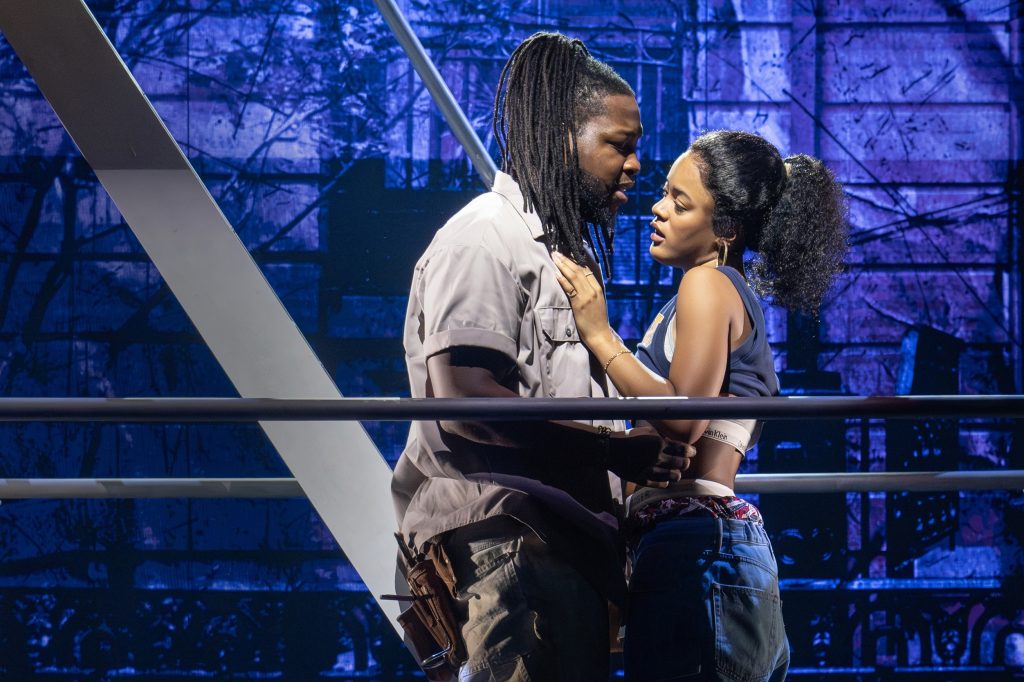
Blackstone, choreography by Camille A. Brown, and direction by Michael Greif – at The Public Theater. Photo Credit: Joan Marcus
Ali is smitten by Knuck (played with endearing sensitivity by Chris Lee), a young man with dreadlocks and muscular arms who plays in a STOMP-like drum corps outside her building. Ali’s friends Tiny (Vanessa Ferguson) and Jessica (Jackie Leon) tease her for never introducing herself, which launches Keys’ “You Don’t Know My Name,” setting the stage for how Keys’ iconic songs are used to propel the narrative. Other gems woven seamlessly into the story include “Teenage Love Affair,” where Jersey recounts how she was dazzled into love and bed by Ali’s father, Davis, a jazz pianist played by the dashing, honey-voiced Brandon Victor Dixon, resulting in Ali’s unexpected yet joyous arrival. The cautionary tale is recreated through a flashback to that fateful day in Tompkins Square Park, where Bean transforms into a teenage girl, all bright-eyed and splendor in the grass.
“Un-thinkable (I’m Ready)” is powerfully delivered through subtlety and dynamic tension between Ali and Knucks as they let the scaffolding around their hearts down and allow each other in. Fingers interlace, and the lyrics are almost whispered then proclaimed, intensity pushing past restraint through resonant vocals that shatter any fears or boundaries. It captures the essence of a “first time” perfectly. Camille A. Brown’s sensual whirlwind choreography personifies the butterflies in the stomach of a budding romance. The City disappears as the lovers commit to each other, body, mind and soul, if only for a fleeting time. The rapturous “Girl on Fire” is Ali’s walking-on-air morning-after anthem, which also offers Tiny the best line in the show, “The world is hers ’cause she got a man now? That’s what we’re doing?” bringing Ali’s head from the clouds and back to reality. But who hasn’t felt (or sang) they’re “on fire” when things are going well?
If Bean’s Jersey is the heart, Kecia Lewis as Miss Liza Jane is the show’s soul. Ali’s sexual awakening with Knuck leads to her creative awakening with Miss Liza Jane in the Ellington Room of Manhattan Plaza. Eager to avoid her mother, Ray, Crystal, Millie or anyone else who might take one whiff or glance at her and immediately detect her recent deflowering, Ali ducks into the recital hall and encounters an angelic yet formidable force on the keys who will transform the trajectory of her life more than any young man could. While some other HELL’S KITCHEN characters are over-the-top and can verge on caricatures at times, Lewis’ Liza Jane is a regal, dignified, stately, and elegant yet-down-to-earth Black woman, powerful in her stillness. She’s the one who plucks Ali from her microcosm of selfish teenage woes into the macrocosm of the bigger picture and the greater world around her. Miss Liza Jane acts as a muse and guide, expanding Ali’s perspectives and opening her mind and heart. She teaches her piano along with discipline and life lessons, including loss.
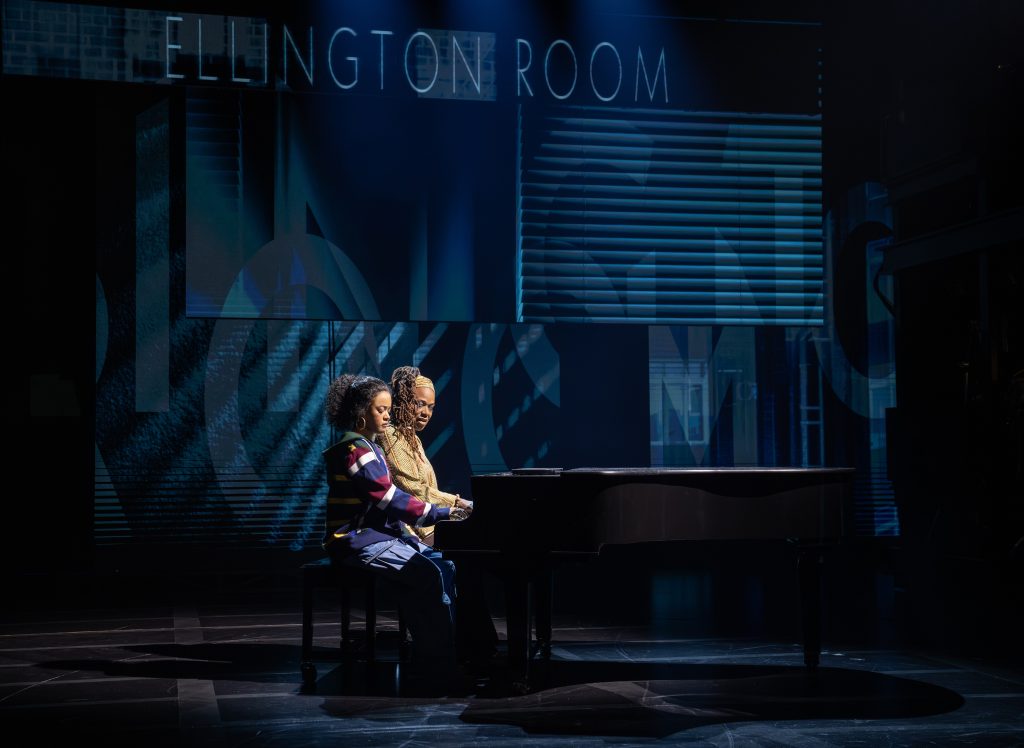
Blackstone, choreography by Camille A. Brown, and direction by Michael Greif – at The Public Theater.
Photo Credit: Joan Marcus
Kristoffer Diaz’s book works well at stringing some of the precious pearls of Keys’ treasured oeuvre together to create a cohesive, simple, yet relatable story instead of a standard jukebox musical of the hits, one after another, without any driving force. It loses momentum when veering from the simplicity of a sweet, coming-of-age story, feels forced when race relations and police intimidations abruptly consume the focus and gets a bit hokey when Ali breaks the fourth wall and repeatedly addresses the audience. But there are also magical moments that use the potency of Keys’ storytelling through song ability in fresh, unexpected ways, making one rethink the original intention or addressee. In “If I Ain’t Got You,” Davis uses his smooth talk and skillful piano playing to charm his way back into his daughter’s heart with a song he says he wrote for her as a child, which morphs into a powerful daddy-daughter duet. “No One” becomes a mother-daughter R&B power ballad, a beautiful tribute to The warmth of Bean and Moon’s genuine connection; their sparkling chemistry, believability, and extraordinary vocals resonate throughout the theater.
The music’s fresh direction was especially reflected in clever and playful arrangements and orchestrations from Keys, Adam Blackstone and Tom Kitt. Keys’ first bonafide hit, “Fallin’,” takes an unexpected approach as a duet between Ali’s parents, Jersey and Davis, as an alluring vocal tango of their passionate yet painful history together. But instead of a heart-wrenching gospel chorus as in the original song, “Fallin'” swings suddenly into a fast-paced, uptempo jazz melody. Dixon nails Davis’s seductive appeal, which is made all the more dangerous when teamed with his fleeting, fleeing nature, which only leads his two lovely ladies to torment and heartache time and again. Of course, no New York musical by Alicia Keys could omit “Empire State of Mind,” which acts as the show’s finale, sums up the feeling of the City in a few verses, and sends the audience out into the streets singing.
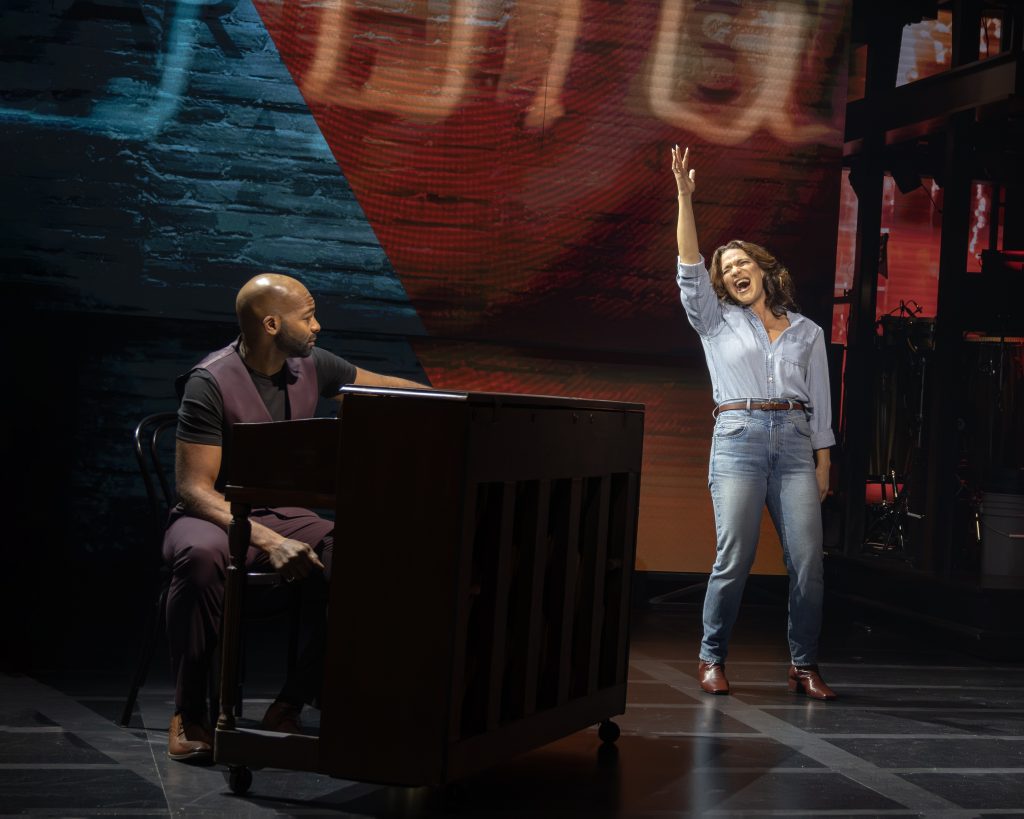
Some of the four new songs are less effective, written exclusively for the musical. One glaring example is “Seventeen,” a vocal exchange between Jersey, Ray, the doorman (Chad Carstarphen) and Jersey’s besties, Crystal (Crystal Monee Hall) and Millie (Mariand Torres), where the mother vents her frustrations that her polite, intelligent and only mildly rebellious daughter is “seventeen and her brain just don’t work.” It’s an unfortunate waste of Shoshana Bean’s many talents, especially early into the show (she more than makes up for it later) and gives the actresses playing Crystal and Millie (who both have strong voices) little to do but act as gossipy neighbors with little to do but buzz around the front desk. The introductory song, “The Gospel,” an ode to Hell’s Kitchen where the main characters get a verse or two, and “The River,” Ali’s angsty teenage lament, yearning for independence by Pier 83 on The Hudson River, are more effective. But the new show tunes hardly hold a candle to Grammy-winning revelations that set one’s soul aflame like Keys’ music can do.
The stellar creative team assembled are all well-suited for the production, in theory, though some of their choices in practice were stronger than others. Having directed one of the most iconic New York musicals, RENT, Grief was a natural choice to helm HELL’S KITCHEN. The show has a good flow, pace and visual style that echos the buzz of NYC streets, but it’s much more in the vibe of In The Heights, celebratory over controversial with mild conflicts instead of life-or-death issues of the drug and AIDS crises affecting the characters of RENT. Robert Brill’s scenic design acts as scaffolding (another cue from various RENT productions) and creates the multi-leveled bones of the City where Peter Nigrini’s video projections flesh out the various locations along with moody, vibrant lighting by Natasha Katz. The open set allowed the small but mighty band to shine. The resonant, theatrical renditions of Keys’ music are led by music director Dominic Fallacaro and feature Aziza Miller (piano), Marc Malsegna (guitar), Aaron Romero (bass), Jaylen Petinued (drums) and Victor Pablo (percussion), aided by Gareth Owen’s robust sound design.
Camille A. Brown has become a go-to choreographer on and off Broadway, stages and screens, but some of her interpretive movements felt pushed and awkward, taking up space where stillness would have been a more meaningful choice. A prime example is at the funeral, where bodies suddenly convulsed, distracting from the intensity of sitting with sorrow and letting it sink in. Brown’s choreography is most effective and delightful when used to turn back time to the 1990s. Some numbers feel like a flashback to music videos on MTV from that era. The more abstract, interpretive style worked in scenes like the young lovers’ first time because the bodies in motion expressed feelings that couldn’t be spoken.
Another time trip was Dede Ayite’s costumes and Mia Neal’s hair and wig design, full-throttle 1990s throwbacks where labels like Tommy Hilfiger and Fubu proclaimed their place on the bodies of young men and women, and baggy, urban, and decidedly unfeminine silhouettes ruled. Moon’s petite frame is swimming in oversized clothes, save a strip of skin here and there, but that was the look, and the clothes and hair offer the quickest time portal.
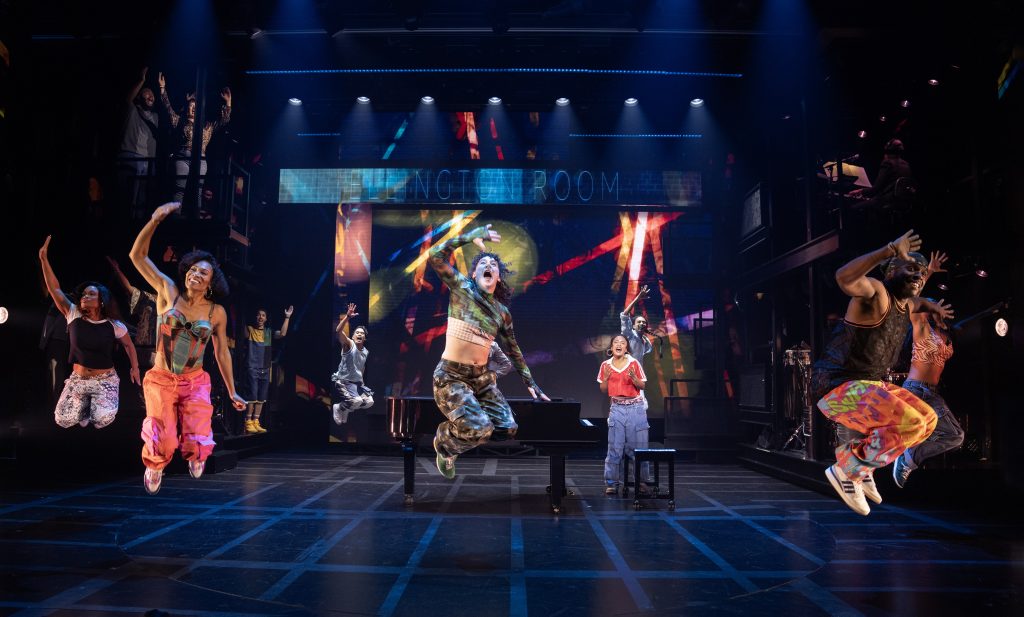
So how much of HELL’S KITCHEN mirrors actual events, people and places in Alicia’s life during her teenage years at Manhattan Plaza? To investigate more deeply, I had to go to the source, not Alicia Keys herself, but those who knew her around this time. Fortunately, my best friend and her family are long-time Manhattan Plaza residents and personally knew Alicia at this pinnacle moment in her history. Over Thanksgiving dinner, I shared insights from the show, and they confirmed or debunked some of the key elements, themes, and characters. Here’s the insider’s scoop:
For starters, yes, Alicia lived in the famed building with her single mom (her father was absent, as in the show). But, she was a “good girl,” the opposite of a rebellious troublemaker who had to be monitored by neighbors and observers. She was kind and patient and taught piano to the residents’ kids, including my friend’s sister, who remembers her fondly. Alicia only missed a lesson when delivering her valedictorian speech at high school graduation. She was accepted into top schools, debating pursuing music or child psychology. But perhaps being an honor roll student doesn’t make for such a compelling dramatic narrative. The “Ray” character is most likely modeled on Mr. Burgess, a sturdy Black man who manned the front desk and acted as a surrogate uncle and protector to Manhattan Plaza’s youth from the dangers outside the door.
The real “Miss Liza Jane” was a white woman, Margaret Pine, who taught piano lessons from her apartment. The Ellington room was more used for recitals and performances. Ali and Miss Liza Jane’s conversations about “your ancestors summoned you here” happening between Pine and Keys (née Augello Cook) were unlikely and are a major point in the musical, though Pine offered a very rounded musical education that included jazz. Pine was initially hurt when Alicia exploded on the music scene and didn’t credit her as her teacher from first grade through high school. She even wrote a letter to The New York Times in response to the article about Alicia Keys in 2002, correcting her position and claiming her title as the one who taught Alicia both classical and jazz piano during her formative years. The two have reconciled, and Keys’ has publicly thanked and acknowledged Pine for her decades of devoted instruction and support that shaped her creativity and career.
As for how the demographics of the HELL’S KITCHEN cast compare to the residents of Manhattan Plaza and neighborhood dynamics at that time, the musical seems more reflective of Harlem or Washington Heights than Midtown West at a glance. However, my insiders acknowledged that a particular group would gather at the building’s playground or around the complex to shoot hoops and hang out, much like in the show. One notable among many was tap star Savion Glover, who was working on what would become his Broadway show “Bring in ’da Noise Bring in ’da Funk,” a tap revue of Black history from slavery to 1995 (present-day at the time). What’s interesting about history and reality is that it all depends on who’s telling the story from their memory and perspective.
In essence, HELL’S KITCHEN is a coming-of-age story about a regular teenager dealing with rather unremarkable circumstances while living in an extraordinary city who happens to possess the spark of exceptional talent, ability and drive. Despite a few bits where a dramatic license was taken (after all, the show is “loosely based on” Keys’ experiences, therefore not entirely autobiographical), it rings true as the origin story of a shining jewel hidden among NYC’s 8 million inhabitants. HELL’S KITCHEN is at its most inspirational when it’s commonplace. Chalk it up to the Alicia Keys Experience; her songs, stories, and persona are universally appealing, accessible and relatable because they feel as familiar and approachable as the girl in the apartment next door. So who knows what young Alicia Keys types, seemingly ordinary “good girls” with immense potential, could see themselves in Ali and be motivated to dare for more than to dream it but to do it and be it, whatever the aspirations are that they want to accomplish. HELL’S KITCHEN sets the stage for infinite possibilities in the City of Wonder.
TICKET INFORMATION: HELL’S KITCHEN began performances in The Public’s Newman Theater with a Joseph Papp Free Performance on Tuesday, October 24 and officially opens on Sunday, November 19. Originally scheduled to run through Sunday, December 10, HELL’S KITCHEN has extended five weeks and will now close on Sunday, January 14, 2024.
Tickets can be accessed by visiting publictheater.org, calling 212.967.7555, or in person at the Taub Box Office at The Public Theater at 425 Lafayette Street. $40 tickets are available in multiple ways. On the day of most performances, a limited number of tickets will be available through a digital lottery provided by TodayTix, and an in-person ticket lottery will be held in the lobby of The Public Theater prior to each scheduled performance. In-person lottery entry will open two and a half hours prior to each scheduled performance, with the lottery starting 30 minutes later. Student tickets may also be purchased in advance at The Public Theater Box Office with a valid student ID. Tickets are subject to availability; please check publictheater.org for the most up-to-date information.
The performance schedule is Tuesday through Sunday at 7:00 p.m. and Saturday and Sunday at 1:00p.m. (There will be no 1:00 p.m. performance on Sunday, November 19. There will be a 1:00 p.m. performance on Tuesday, November 21 and Wednesday, December 27. The performance on Wednesday, November 22, will be at 1:00 p.m.There will be no performance on Thursday, November 23 or Sunday, December 24. There will be a 1:00 p.m. performance on Wednesday, December 20 and Friday, December 22. There will be no 7:00 p.m. performance on Sunday, December 31.)
 Friday, January 2, 2026
Friday, January 2, 2026
A truly phenomenal review. Can’t wait to see the show now. Thank you!